Abstract
Lithium is the first-line treatment for bipolar disorder. In the past, genetic studies have attempted to identify factors associated with positive treatment response or side effects. Several research groups have shown that familial factors, family history of primary bipolar disorder, and negative family history of schizophrenia in particular, correlate well with prophylactic lithium response. Conversely, studies of lithium responsive patients and their families can assist genetic research of bipolar disorder. Lithium responders appear to suffer from a form of bipolar disorder that is more genetically based and more homogeneous. In a series of family studies, the author and his colleagues have confirmed the differences in family histories of lithium responders and nonresponders and shown that the mode of inheritance in lithium responders is compatible with a major-gene model. Subsequently, they initiated an international collaborative study to map the gene(s) predisposing to the illness or treatment response, or both, using both linkage and association strategies. To date, a sample of 32 families, 138 unrelated patients and 163 control subjects has been studied. In these studies, they found support for the role of phospholipase C in lithium responsive bipolar disorder.
Full text
PDF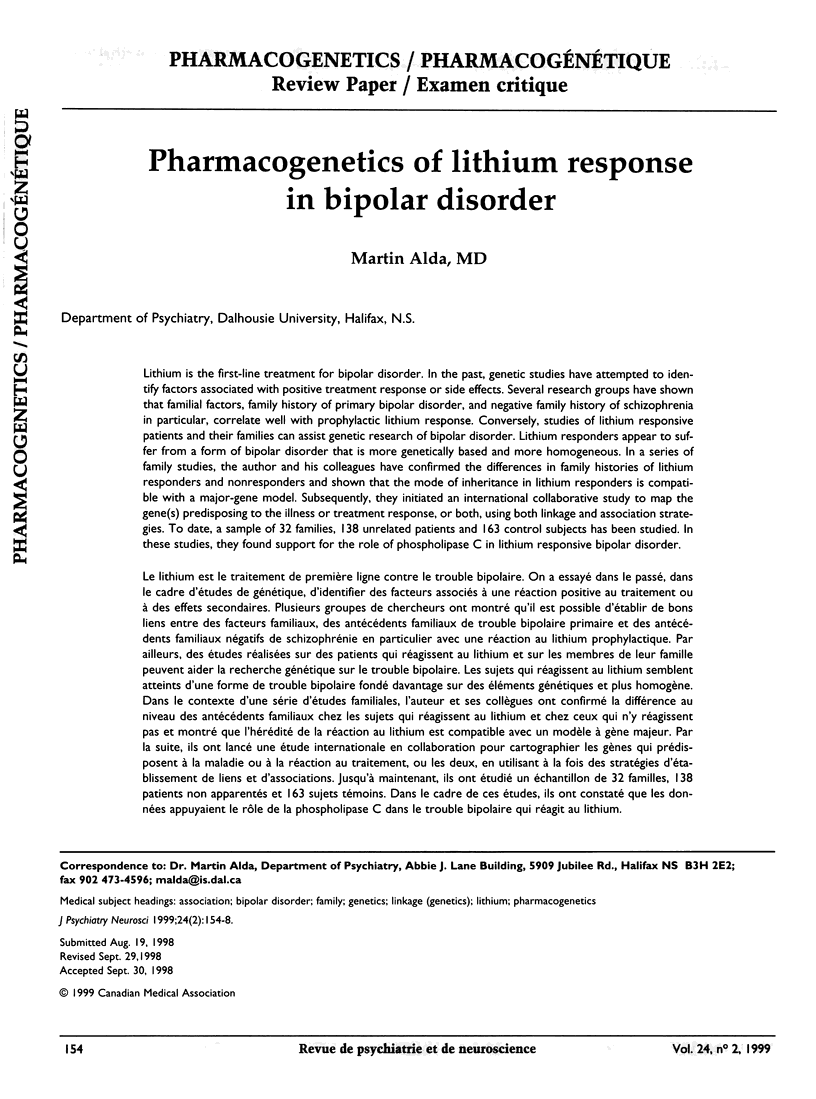
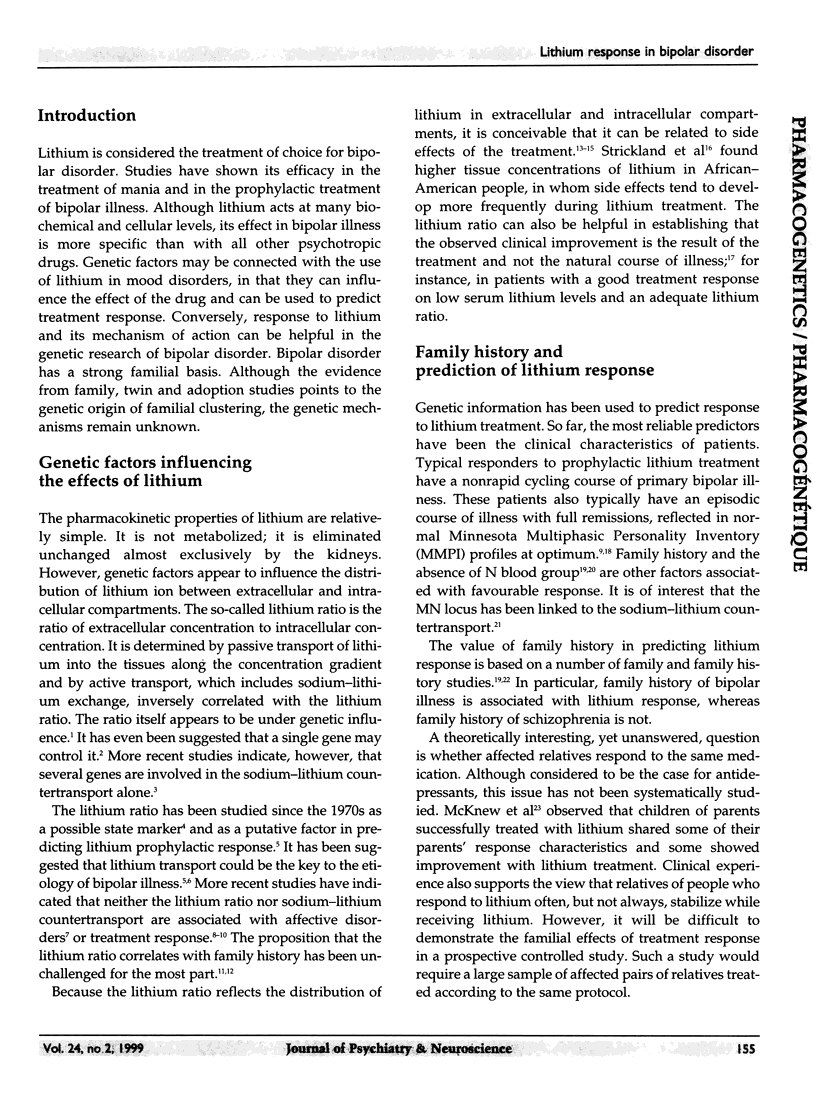
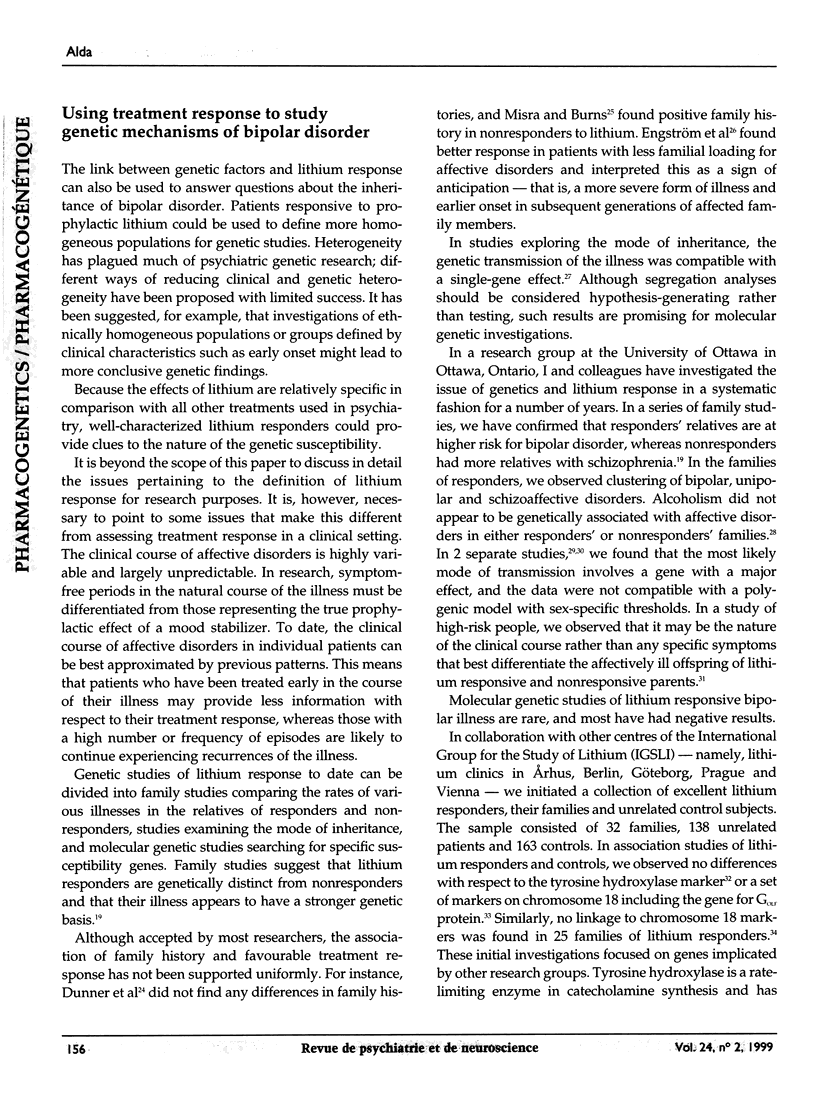
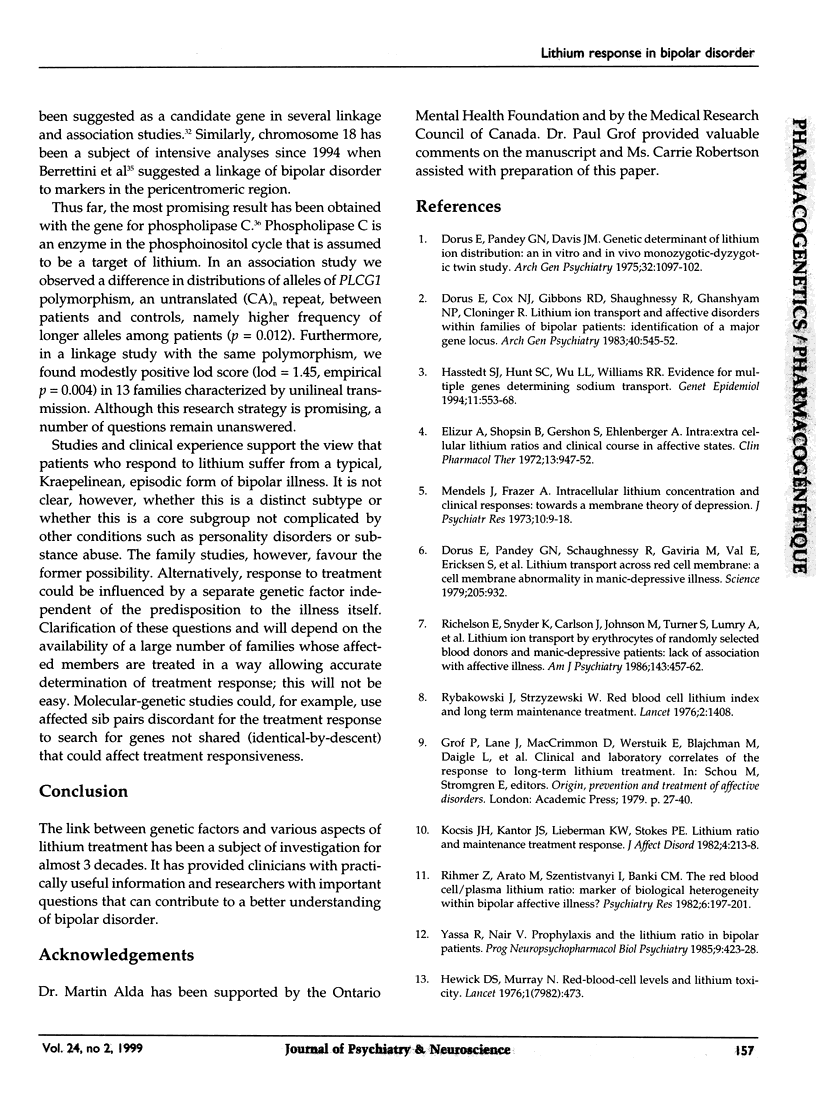
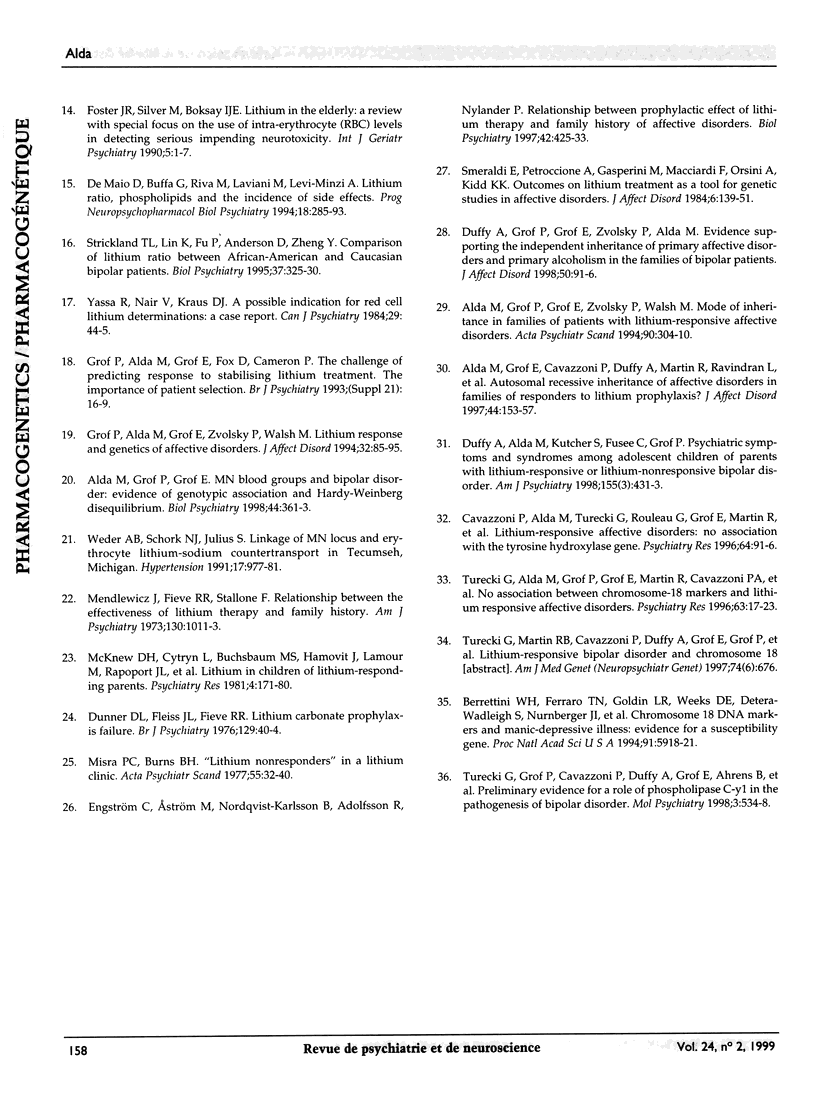
Selected References
These references are in PubMed. This may not be the complete list of references from this article.
- Alda M., Grof E., Cavazzoni P., Duffy A., Martin R., Ravindran L., Grof P. Autosomal recessive inheritance of affective disorders in families of responders to lithium prophylaxis? J Affect Disord. 1997 Jul;44(2-3):153–157. doi: 10.1016/s0165-0327(97)00042-6. [DOI] [PubMed] [Google Scholar]
- Alda M., Grof P., Grof E. MN blood groups and bipolar disorder: evidence of genotypic association and Hardy-Weinberg disequilibrium. Biol Psychiatry. 1998 Sep 1;44(5):361–363. doi: 10.1016/s0006-3223(98)00013-4. [DOI] [PubMed] [Google Scholar]
- Alda M., Grof P., Grof E., Zvolsky P., Walsh M. Mode of inheritance in families of patients with lithium-responsive affective disorders. Acta Psychiatr Scand. 1994 Oct;90(4):304–310. doi: 10.1111/j.1600-0447.1994.tb01598.x. [DOI] [PubMed] [Google Scholar]
- Berrettini W. H., Ferraro T. N., Goldin L. R., Weeks D. E., Detera-Wadleigh S., Nurnberger J. I., Jr, Gershon E. S. Chromosome 18 DNA markers and manic-depressive illness: evidence for a susceptibility gene. Proc Natl Acad Sci U S A. 1994 Jun 21;91(13):5918–5921. doi: 10.1073/pnas.91.13.5918. [DOI] [PMC free article] [PubMed] [Google Scholar]
- Cavazzoni P., Alda M., Turecki G., Rouleau G., Grof E., Martin R., Duffy A., Grof P. Lithium-responsive affective disorders: no association with the tyrosine hydroxylase gene. Psychiatry Res. 1996 Sep 27;64(2):91–96. doi: 10.1016/0165-1781(96)02888-0. [DOI] [PubMed] [Google Scholar]
- De Maio D., Buffa G., Riva M., Laviani M., Levi-Minzi A. Lithium ratio, phospholipids and the incidence of side effects. Prog Neuropsychopharmacol Biol Psychiatry. 1994 Mar;18(2):285–293. doi: 10.1016/0278-5846(94)90060-4. [DOI] [PubMed] [Google Scholar]
- Dorus E., Cox N. J., Gibbons R. D., Shaughnessy R., Pandey G. N., Cloninger C. R. Lithium ion transport and affective disorders within families of bipolar patients. Identification of a major gene locus. Arch Gen Psychiatry. 1983 May;40(5):545–552. doi: 10.1001/archpsyc.1983.01790050071009. [DOI] [PubMed] [Google Scholar]
- Dorus E., Pandey G. N., Davis J. M. Genetic determinant of lithium ion distribution. An in vitro and in vivo monozygotic-dizygotic twin study. Arch Gen Psychiatry. 1975 Sep;32(9):1097–1102. doi: 10.1001/archpsyc.1975.01760270029002. [DOI] [PubMed] [Google Scholar]
- Dorus E., Pandey G. N., Shaughnessy R., Gaviria M., Val E., Ericksen S., Davis J. M. Lithium transport across red cell membrane: a cell membrane abnormality in manic-depressive illness. Science. 1979 Aug 31;205(4409):932–934. doi: 10.1126/science.472716. [DOI] [PubMed] [Google Scholar]
- Duffy A., Alda M., Kutcher S., Fusee C., Grof P. Psychiatric symptoms and syndromes among adolescent children of parents with lithium-responsive or lithium-nonresponsive bipolar disorder. Am J Psychiatry. 1998 Mar;155(3):431–433. doi: 10.1176/ajp.155.3.431. [DOI] [PubMed] [Google Scholar]
- Duffy A., Grof P., Grof E., Zvolsky P., Alda M. Evidence supporting the independent inheritance of primary affective disorders and primary alcoholism in the families of bipolar patients. J Affect Disord. 1998 Sep;50(2-3):91–96. doi: 10.1016/s0165-0327(98)00017-2. [DOI] [PubMed] [Google Scholar]
- Dunner D. L., Fleiss J. L., Fieve R. R. Lithium carbonate prophylaxis failure. Br J Psychiatry. 1976 Jul;129:40–44. doi: 10.1192/bjp.129.1.40. [DOI] [PubMed] [Google Scholar]
- Elizur A., Shopsin B., Gershon S., Ehlenberger A. Intra:extracellular lithium ratios and clinical course in affective states. Clin Pharmacol Ther. 1972 Nov-Dec;13(6):947–953. doi: 10.1002/cpt1972136947. [DOI] [PubMed] [Google Scholar]
- Engström C., Aström M., Nordqvist-Karlsson B., Adolfsson R., Nylander P. O. Relationship between prophylactic effect of lithium therapy and family history of affective disorders. Biol Psychiatry. 1997 Sep 15;42(6):425–433. doi: 10.1016/S0006-3223(96)00374-5. [DOI] [PubMed] [Google Scholar]
- Grof P., Alda M., Grof E., Zvolsky P., Walsh M. Lithium response and genetics of affective disorders. J Affect Disord. 1994 Oct;32(2):85–95. doi: 10.1016/0165-0327(94)90066-3. [DOI] [PubMed] [Google Scholar]
- Hasstedt S. J., Hunt S. C., Wu L. L., Williams R. R. Evidence for multiple genes determining sodium transport. Genet Epidemiol. 1994;11(6):553–568. doi: 10.1002/gepi.1370110610. [DOI] [PubMed] [Google Scholar]
- Hewick D. S., Murray N. Red-blood-cell levels and lithium toxicity. Lancet. 1976 Aug 28;2(7983):473–473. doi: 10.1016/s0140-6736(76)92569-1. [DOI] [PubMed] [Google Scholar]
- Kocsis J. H., Kantor J. S., Lieberman K. W., Stokes P. E. Lithium ratio and maintenance treatment response. J Affect Disord. 1982 Sep;4(3):213–218. doi: 10.1016/0165-0327(82)90005-2. [DOI] [PubMed] [Google Scholar]
- McKnew D. H., Cytryn L., Buchsbaum M. S., Hamovit J., Lamour M., Rapoport J. L., Gershon E. S. Lithium in children of lithium-responding parents. Psychiatry Res. 1981 Apr;4(2):171–180. doi: 10.1016/0165-1781(81)90020-2. [DOI] [PubMed] [Google Scholar]
- Mendels J., Frazer A. Intracellular lithium concentration and clinical response: towards a membrane theory of depression. J Psychiatr Res. 1973 Jun;10(1):9–18. doi: 10.1016/0022-3956(73)90005-8. [DOI] [PubMed] [Google Scholar]
- Mendlewicz J., Fieve R. R., Stallone F. Relationship between the effectiveness of lithium therapy and family history. Am J Psychiatry. 1973 Sep;130(9):1011–1013. doi: 10.1176/ajp.130.9.1011. [DOI] [PubMed] [Google Scholar]
- Misra P. C., Burns B. H. "Lithium non-responders" in a lithium clinic. Acta Psychiatr Scand. 1977 Jan;55(1):32–40. doi: 10.1111/j.1600-0447.1977.tb00138.x. [DOI] [PubMed] [Google Scholar]
- Richelson E., Snyder K., Carlson J., Johnson M., Turner S., Lumry A., Boerwinkle E., Sing C. F. Lithium ion transport by erythrocytes of randomly selected blood donors and manic-depressive patients: lack of association with affective illness. Am J Psychiatry. 1986 Apr;143(4):457–462. doi: 10.1176/ajp.143.4.457. [DOI] [PubMed] [Google Scholar]
- Rihmer Z., Arató M., Szentistványi I., Bánki C. M. The red blood cell/plasma lithium ratio: marker of biological heterogeneity within bipolar affective illness? Psychiatry Res. 1982 Apr;6(2):197–201. doi: 10.1016/0165-1781(82)90007-5. [DOI] [PubMed] [Google Scholar]
- Rybakowski J., Strzyzewski W. Letter: Red-blood-cell lithium index and long-term maintenance treatment. Lancet. 1976 Jun 26;1(7974):1408–1409. doi: 10.1016/s0140-6736(76)93056-7. [DOI] [PubMed] [Google Scholar]
- Smeraldi E., Petroccione A., Gasperini M., Macciardi F., Orsini A., Kidd K. K. Outcomes on lithium treatment as a tool for genetic studies in affective disorders. J Affect Disord. 1984 Apr;6(2):139–151. doi: 10.1016/0165-0327(84)90019-3. [DOI] [PubMed] [Google Scholar]
- Strickland T. L., Lin K. M., Fu P., Anderson D., Zheng Y. Comparison of lithium ratio between African-American and Caucasian bipolar patients. Biol Psychiatry. 1995 Mar 1;37(5):325–330. doi: 10.1016/0006-3223(94)00133-N. [DOI] [PubMed] [Google Scholar]
- Turecki G., Alda M., Grof P., Martin R., Cavazzoni P. A., Duffy A., Maciel P., Rouleau G. A. No association between chromosome-18 markers and lithium-responsive affective disorders. Psychiatry Res. 1996 Jun 26;63(1):17–23. doi: 10.1016/0165-1781(96)02864-8. [DOI] [PubMed] [Google Scholar]
- Turecki G., Grof P., Cavazzoni P., Duffy A., Grof E., Ahrens B., Berghöfer A., Müller-Oerlinghausen B., Dvoráková M., Libigerová E. Evidence for a role of phospholipase C-gamma1 in the pathogenesis of bipolar disorder. Mol Psychiatry. 1998 Nov;3(6):534–538. doi: 10.1038/sj.mp.4000447. [DOI] [PubMed] [Google Scholar]
- Weder A. B., Schork N. J., Julius S. Linkage of MN locus and erythrocyte lithium-sodium countertransport in Tecumseh, Michigan. Hypertension. 1991 Jun;17(6 Pt 2):977–981. doi: 10.1161/01.hyp.17.6.977. [DOI] [PubMed] [Google Scholar]
- Yassa R., Nair V., Kraus D. J. A possible indication for red cell lithium determinations: a case report. Can J Psychiatry. 1984 Feb;29(1):44–45. doi: 10.1177/070674378402900111. [DOI] [PubMed] [Google Scholar]
- Yassa R., Nair V. Prophylaxis and the lithium ratio in bipolar patients. Prog Neuropsychopharmacol Biol Psychiatry. 1985;9(4):423–428. doi: 10.1016/0278-5846(85)90196-4. [DOI] [PubMed] [Google Scholar]


